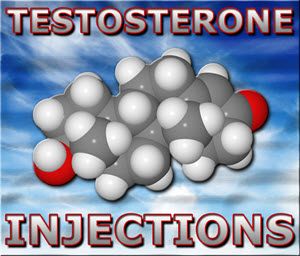Introduction
Testosterone replacement therapy (TRT) has become increasingly prevalent among American males seeking to mitigate the effects of low testosterone levels, which can manifest as reduced energy, diminished libido, and mood disturbances. While the benefits of TRT on sexual health and overall well-being are well-documented, the potential effects on gastrointestinal (GI) health remain underexplored. This article delves into the relationship between TRT and GI health, providing insights into how this therapy may influence digestive function and overall gut health in American males.
The Role of Testosterone in Gastrointestinal Health
Testosterone, a pivotal hormone in male physiology, exerts influence beyond its well-known roles in sexual and reproductive health. Emerging research suggests that testosterone may also play a role in maintaining gastrointestinal homeostasis. The hormone has been linked to the regulation of gut motility, the integrity of the gut barrier, and even the composition of the gut microbiota. As such, fluctuations in testosterone levels, whether natural or induced by TRT, could potentially impact GI health.
Testosterone Replacement Therapy: A Double-Edged Sword?
While TRT is designed to restore testosterone levels to a normal range, its effects on the gastrointestinal system are not fully understood. Some studies have suggested that TRT might improve gut health by enhancing muscle tone in the GI tract, potentially aiding in the prevention of conditions such as constipation. However, other research indicates that TRT could disrupt the delicate balance of gut bacteria, leading to dysbiosis—a state associated with various GI disorders, including irritable bowel syndrome (IBS) and inflammatory bowel disease (IBD).
Clinical Observations and Patient Reports
Clinical observations and patient reports have provided anecdotal evidence of the impact of TRT on GI health. Some patients have reported improvements in digestive symptoms following the initiation of TRT, while others have experienced new or exacerbated GI issues. These varying responses underscore the need for personalized approaches to TRT, taking into account the individual's baseline GI health and potential risk factors for GI disorders.
Potential Mechanisms of Action
The mechanisms by which TRT may affect GI health are multifaceted. Testosterone receptors are present in the GI tract, suggesting direct hormonal influence on digestive function. Additionally, testosterone can modulate the immune system and inflammation, both of which are critical to maintaining gut health. Furthermore, the hormone's impact on body composition and metabolism could indirectly affect GI health by altering dietary habits and nutrient absorption.
Navigating the Risks and Benefits
Given the potential for both positive and negative effects on GI health, American males considering TRT should engage in thorough discussions with their healthcare providers. A comprehensive evaluation, including a review of medical history, current medications, and lifestyle factors, is essential to assess the suitability of TRT and to develop a monitoring plan for any GI symptoms that may arise during therapy.
Future Research Directions
The relationship between TRT and GI health warrants further investigation to elucidate the mechanisms at play and to establish guidelines for safe and effective use of TRT in the context of gastrointestinal well-being. Future studies should focus on longitudinal assessments of GI health in TRT users, the impact of different TRT formulations, and the role of diet and lifestyle modifications in mitigating potential GI side effects.
Conclusion
As TRT continues to gain popularity among American males, understanding its full spectrum of effects, including those on gastrointestinal health, is crucial. While TRT offers significant benefits for many, its impact on the GI system highlights the importance of a holistic approach to hormone therapy. By staying informed and working closely with healthcare professionals, American males can navigate the complexities of TRT and optimize their overall health and well-being.
Contact Us Today For A Free Consultation

- TRT's Impact on Mental Health in American Men: Depression, Anxiety, and Cognition [Last Updated On: February 21st, 2025] [Originally Added On: February 21st, 2025]
- Economic Impact of Testosterone Replacement Therapy on U.S. Healthcare System [Last Updated On: March 16th, 2025] [Originally Added On: March 16th, 2025]
- TRT: Understanding Impacts on Prostate Health and Cancer Risk in American Men [Last Updated On: March 18th, 2025] [Originally Added On: March 18th, 2025]
- Testosterone Replacement Therapy: American Men's Experiences and Impact on Quality of Life [Last Updated On: March 18th, 2025] [Originally Added On: March 18th, 2025]
- Optimizing TRT: Diet, Exercise, and Holistic Health for American Men [Last Updated On: March 19th, 2025] [Originally Added On: March 19th, 2025]
- Navigating Insurance for Testosterone Replacement Therapy: A Guide for American Males [Last Updated On: March 19th, 2025] [Originally Added On: March 19th, 2025]
- Testosterone Replacement Therapy: Benefits, Risks, and Management for American Men [Last Updated On: March 19th, 2025] [Originally Added On: March 19th, 2025]
- Testosterone Replacement Therapy: Dosage, Administration, and Lifestyle Integration for American Males [Last Updated On: March 20th, 2025] [Originally Added On: March 20th, 2025]
- Enhancing TRT Outcomes with Alternative Therapies: A Holistic Approach for American Men [Last Updated On: March 20th, 2025] [Originally Added On: March 20th, 2025]
- Future of TRT: Innovations and Impacts on American Men's Health [Last Updated On: March 20th, 2025] [Originally Added On: March 20th, 2025]
- Testosterone Replacement Therapy: Benefits and Risks for Young American Men [Last Updated On: March 21st, 2025] [Originally Added On: March 21st, 2025]
- TRT Improves Sleep Quality in American Males with Hypogonadism: A Comprehensive Overview [Last Updated On: March 21st, 2025] [Originally Added On: March 21st, 2025]
- TRT: Managing Hypogonadism in American Males - Benefits, Risks, and Future Trends [Last Updated On: March 21st, 2025] [Originally Added On: March 21st, 2025]
- Testosterone Replacement Therapy: Combating Fatigue in American Men [Last Updated On: March 21st, 2025] [Originally Added On: March 21st, 2025]
- TRT Boosts Bone Health in American Males: Benefits, Evidence, and Lifestyle Integration [Last Updated On: March 21st, 2025] [Originally Added On: March 21st, 2025]
- Testosterone Replacement Therapy: Cultural Attitudes and Masculinity in American Men [Last Updated On: March 22nd, 2025] [Originally Added On: March 22nd, 2025]
- Testosterone Replacement Therapy: Managing Side Effects in American Males [Last Updated On: March 22nd, 2025] [Originally Added On: March 22nd, 2025]
- Testosterone Replacement Therapy: Enhancing Muscle Mass in American Men [Last Updated On: March 23rd, 2025] [Originally Added On: March 23rd, 2025]
- TRT's Impact on Immune Function: Benefits, Risks, and Monitoring in American Men [Last Updated On: March 23rd, 2025] [Originally Added On: March 23rd, 2025]
- Testosterone Replacement Therapy: Benefits, Risks, and Process for American Men [Last Updated On: March 23rd, 2025] [Originally Added On: March 23rd, 2025]
- Optimizing Testosterone Replacement Therapy: Monitoring, Adjustments, and Lifestyle Integration for American Males [Last Updated On: March 23rd, 2025] [Originally Added On: March 23rd, 2025]
- Testosterone Replacement Therapy: Impacts on Cardiovascular Health in American Men [Last Updated On: March 23rd, 2025] [Originally Added On: March 23rd, 2025]
- TRT in American Men: Balancing Benefits with Hair Loss Risks [Last Updated On: March 24th, 2025] [Originally Added On: March 24th, 2025]
- Testosterone Replacement Therapy: A Promising Treatment for Depression in American Males [Last Updated On: March 24th, 2025] [Originally Added On: March 24th, 2025]
- Testosterone Replacement Therapy: Benefits, Risks, and Management for Aging American Males [Last Updated On: March 24th, 2025] [Originally Added On: March 24th, 2025]
- TRT Enhances Mood and Vitality in American Males: A Comprehensive Overview [Last Updated On: March 24th, 2025] [Originally Added On: March 24th, 2025]
- TRT: Benefits and Risks for Vision Health in American Males [Last Updated On: March 24th, 2025] [Originally Added On: March 24th, 2025]
- TRT's Potential in Enhancing Cognitive Function in American Men with Hypogonadism [Last Updated On: March 24th, 2025] [Originally Added On: March 24th, 2025]
- TRT: Enhancing Joint Health in American Males Through Hormone Therapy [Last Updated On: March 25th, 2025] [Originally Added On: March 25th, 2025]
- TRT: Enhancing Weight Management in American Males with Low Testosterone [Last Updated On: March 25th, 2025] [Originally Added On: March 25th, 2025]
- Testosterone Replacement Therapy: Enhancing Cognitive Function in American Men [Last Updated On: March 25th, 2025] [Originally Added On: March 25th, 2025]
- TRT Impact on Male Fertility: Risks, Alternatives, and Management Strategies [Last Updated On: March 25th, 2025] [Originally Added On: March 25th, 2025]
- Testosterone Replacement Therapy: Benefits, Risks, and Realistic Expectations for Men [Last Updated On: March 25th, 2025] [Originally Added On: March 25th, 2025]
- Testosterone Replacement Therapy: Cost-Benefit Analysis and Accessibility in the U.S. [Last Updated On: March 25th, 2025] [Originally Added On: March 25th, 2025]
- TRT: Enhancing Stamina and Vitality in American Males [Last Updated On: March 25th, 2025] [Originally Added On: March 25th, 2025]
- TRT's Role in Enhancing Injury Recovery Among American Males: Benefits and Considerations [Last Updated On: March 26th, 2025] [Originally Added On: March 26th, 2025]
- TRT: A Promising Approach to Managing Chronic Pain in American Males [Last Updated On: March 26th, 2025] [Originally Added On: March 26th, 2025]
- TRT: A Promising Approach to Stress Management in American Males with Low Testosterone [Last Updated On: March 26th, 2025] [Originally Added On: March 26th, 2025]
- TRT's Impact on Kidney Health: Benefits, Risks, and Monitoring for American Males [Last Updated On: March 26th, 2025] [Originally Added On: March 26th, 2025]
- Testosterone Replacement Therapy: Benefits, Risks, and Holistic Approaches for Low Libido [Last Updated On: March 27th, 2025] [Originally Added On: March 27th, 2025]
- TRT and Liver Health: Risks, Monitoring, and Mitigation Strategies for American Men [Last Updated On: March 27th, 2025] [Originally Added On: March 27th, 2025]
- TRT's Impact on Diabetes: Benefits, Risks, and Personalized Management for American Men [Last Updated On: March 27th, 2025] [Originally Added On: March 27th, 2025]
- Testosterone Replacement Therapy: Benefits, Risks, and Management for American Men [Last Updated On: March 27th, 2025] [Originally Added On: March 27th, 2025]
- TRT: Enhancing Emotional Well-being in Men with Low Testosterone [Last Updated On: March 27th, 2025] [Originally Added On: March 27th, 2025]
- TRT Benefits for American Males: Enhancing Skin Health and Vitality [Last Updated On: March 27th, 2025] [Originally Added On: March 27th, 2025]
- TRT Boosts Confidence and Vitality in American Males: A Comprehensive Overview [Last Updated On: March 28th, 2025] [Originally Added On: March 28th, 2025]
- Testosterone Therapy: Benefits, Risks, and Side Effects for American Men [Last Updated On: March 28th, 2025] [Originally Added On: March 28th, 2025]
- TRT's Impact on Respiratory Health in American Men: Benefits and Considerations [Last Updated On: March 28th, 2025] [Originally Added On: March 28th, 2025]
- TRT's Impact on Digestive Health: Insights for American Men [Last Updated On: March 28th, 2025] [Originally Added On: March 28th, 2025]
- Testosterone Replacement Therapy: Enhancing Effects with Lifestyle Changes for American Males [Last Updated On: March 29th, 2025] [Originally Added On: March 29th, 2025]
- Choosing the Right TRT Clinic: A Guide for American Males [Last Updated On: March 29th, 2025] [Originally Added On: March 29th, 2025]
- TRT's Impact on Blood Pressure: Risks, Benefits, and Management for American Men [Last Updated On: March 29th, 2025] [Originally Added On: March 29th, 2025]
- TRT's Impact on Cholesterol: Essential Insights for American Males [Last Updated On: March 30th, 2025] [Originally Added On: March 30th, 2025]
- Testosterone Replacement Therapy: Restoring Vitality in American Males with Hypogonadism [Last Updated On: April 2nd, 2025] [Originally Added On: April 2nd, 2025]
- TRT's Impact on Thyroid Function: Monitoring and Management Strategies for American Men [Last Updated On: April 2nd, 2025] [Originally Added On: April 2nd, 2025]
- TRT's Impact on Blood Sugar: Insights for American Men Considering Therapy [Last Updated On: April 3rd, 2025] [Originally Added On: April 3rd, 2025]
- Navigating Testosterone Replacement Therapy: Understanding and Interpreting Lab Results [Last Updated On: April 7th, 2025] [Originally Added On: April 7th, 2025]
- Testosterone Replacement Therapy: Enhancing Athletic Performance Safely and Ethically [Last Updated On: April 7th, 2025] [Originally Added On: April 7th, 2025]
- Testosterone Replacement Therapy: Benefits, Allergic Risks, and Management Strategies [Last Updated On: April 8th, 2025] [Originally Added On: April 8th, 2025]
- TRT's Impact on Dental Health: Insights and Recommendations for American Men [Last Updated On: April 9th, 2025] [Originally Added On: April 9th, 2025]
- Maximizing TRT Benefits: Integrating Therapy with Lifestyle and Supplements for American Males [Last Updated On: April 9th, 2025] [Originally Added On: April 9th, 2025]
- TRT and Hearing Health: Considerations for American Males [Last Updated On: April 10th, 2025] [Originally Added On: April 10th, 2025]
- Legal Aspects of Testosterone Replacement Therapy for American Males [Last Updated On: April 10th, 2025] [Originally Added On: April 10th, 2025]
- Guide to Managing Testosterone Replacement Therapy While Traveling [Last Updated On: April 11th, 2025] [Originally Added On: April 11th, 2025]
- Testosterone Replacement Therapy: Enhancing Social Life and Health in American Males [Last Updated On: April 12th, 2025] [Originally Added On: April 12th, 2025]
- TRT's Impact on Eye Health: Benefits for American Men [Last Updated On: April 13th, 2025] [Originally Added On: April 13th, 2025]
- TRT's Impact on Male Fertility: Risks, Evidence, and Mitigation Strategies [Last Updated On: April 13th, 2025] [Originally Added On: April 13th, 2025]
- TRT's Impact on Nail Health: Benefits, Risks, and Management Strategies [Last Updated On: April 13th, 2025] [Originally Added On: April 13th, 2025]
- TRT's Impact on Hand Health in American Men: Strength, Dexterity, and Joints [Last Updated On: April 15th, 2025] [Originally Added On: April 15th, 2025]
- Exploring Social Implications of Testosterone Replacement Therapy in American Males [Last Updated On: April 16th, 2025] [Originally Added On: April 16th, 2025]
- TRT: Enhancing Work Performance in American Males - Benefits and Risks [Last Updated On: April 16th, 2025] [Originally Added On: April 16th, 2025]
- Testosterone Replacement Therapy: Enhancing Artistic Expression in American Males [Last Updated On: April 16th, 2025] [Originally Added On: April 16th, 2025]
- TRT's Impact on Neck Health: Considerations for American Men [Last Updated On: April 16th, 2025] [Originally Added On: April 16th, 2025]
- TRT: Enhancing Foot Health in American Males Through Testosterone Therapy [Last Updated On: April 17th, 2025] [Originally Added On: April 17th, 2025]
- Ethical Considerations in Testosterone Replacement Therapy for American Men [Last Updated On: April 19th, 2025] [Originally Added On: April 19th, 2025]
- TRT Impact on Chest Health: Benefits, Risks, and Management in American Men [Last Updated On: April 19th, 2025] [Originally Added On: April 19th, 2025]
- Testosterone Replacement Therapy: Psychological Benefits and Risks for American Men [Last Updated On: April 19th, 2025] [Originally Added On: April 19th, 2025]
- TRT: Enhancing Back Health in American Males with Low Testosterone [Last Updated On: April 20th, 2025] [Originally Added On: April 20th, 2025]
- TRT Enhances Glycemic Control in American Men with Type 2 Diabetes: Cohort Study [Last Updated On: April 21st, 2025] [Originally Added On: April 21st, 2025]
- Testosterone Replacement Therapy: Enhancing Male Health and Addressing Low Testosterone in American Men [Last Updated On: April 21st, 2025] [Originally Added On: April 21st, 2025]
Word Count: 598




















